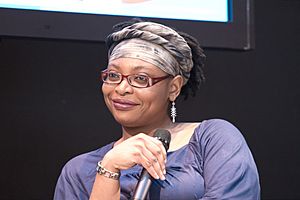Léonora Miano facts for kids
Quick facts for kids Léonora Miano |
|
|---|---|

Miano in 2010
|
|
| Born | 12 March 1973 Douala |
| Language | French language |
| Notable awards | Prix Goncourt des Lycéens, Officier of the Ordre des Arts et des Lettres |
| Website | |
| www |
|
Léonora Miano, born in 1973 in Douala, Cameroon, is a talented author. She writes her books in French. Her stories often explore important ideas about identity and history.
Biography
Léonora Miano grew up in Douala, Cameroon. In 1991, she moved to France. She first lived in Valenciennes and then in Nanterre. There, she studied American Literature.
Her first novel, Dark Heart of the Night, was published in 2005. It was very popular with French critics. The book won several awards, including the Louis Guilloux prize in 2006. Lire magazine even called it the best first French novel of 2005.
Her second novel, Contours du jour qui vient, won the Prix Goncourt des Lycéens award. This special prize is chosen by a jury of high school students aged 15 to 18.
In 2008, Léonora Miano published five short novels together. They were titled Afropean et autres nouvelles. These stories were part of the "Étonnants classiques" collection by the Flammarion Group.
Exploring Identity in Her Books
A scholar named Daniel S. Larangé says that Miano's work creates "Afropean" literature. This means her writing looks at how the world and people are changing. She writes about the "Afropean" identity. This identity combines African and European cultures.
Larangé also mentions that her writing has a "jazzy" style. This means it uses rhythms and improvisations, much like jazz music. It blends popular culture with a musical feel.
In 2013, Léonora Miano won the Prix Femina for her novel La Saison de l'Ombre. This book tells a story about the beginning of the slave trade. It is a powerful and emotional story. It can also be seen as a story about how people are sometimes treated like products in today's world.
In 2015, she put together a collection of stories called Volcaniques: une anthologie du plaisir. Twelve women authors from the black world wrote short stories for this book. Léonora Miano was one of them.
Her Work on Stage
In 2018, a Japanese director named Satoshi Miyagi created a play based on Miano's work. The play was called Révélation. It was the first part of a series about the history of slavery. Miano chose Miyagi because his Japanese background was different from the history of transatlantic slavery. She wanted to avoid "cultural appropriation" by a Western director. This choice created an interesting contrast for the audience.
Léonora Miano's writing has earned her many literary awards. These include the Louis Guilloux Prize (2006) and the Prix Fémina (2013).
Her first novel, Dark Heart of the Night, was translated into English. Miano did not like the introduction added to the English version. She said it was "full of lies." However, other writers have praised her work. In 2012, author Zukiswa Wanner called Miano one of her top five African writers. Wanner described Miano's work as "brilliant."
Awards
Léonora Miano has received many important awards for her writing:
- 2006: Prix Goncourt des Lycéens
- 2006: Prix Louis-Guilloux
- 2006: Montalembert Prize
- 2006: Bernard Palissy Prize
- 2006: René Fallet Prize
- 2011: Grand prix littéraire d'Afrique noire
- 2012: Prix Seligmann
- 2013: Grand prix du roman métis
- 2013: Prix Fémina
Works
Here are some of Léonora Miano's books:
- L'Intérieur de la nuit, 2005
- Dark Heart of the Night (English translation), 2010
- Contours du jour qui vient, 2006
- Afropean Soul, 2008
- Tels des astres éteints, 2008
- Soulfood équatoriale, 2009
- Les Aubes écarlates, 2009
- Blues pour Elise, 2010
- Ces âmes chagrines, 2011
- Écrits pour la parole, 2012
- Habiter la frontière, 2012
- La Saison de l'ombre, 2013 – Won the Prix Femina
- Season of the Shadow (English translation), 2018
- Crépuscule du tourment, 2016
- L’impératif transgressif, 2016
- Crépuscule du tourment 2 Héritage, 2017
- Rouge impératrice, 2019
- Stardust, 2022
See also
 In Spanish: Léonora Miano para niños
In Spanish: Léonora Miano para niños
 | William L. Dawson |
 | W. E. B. Du Bois |
 | Harry Belafonte |

